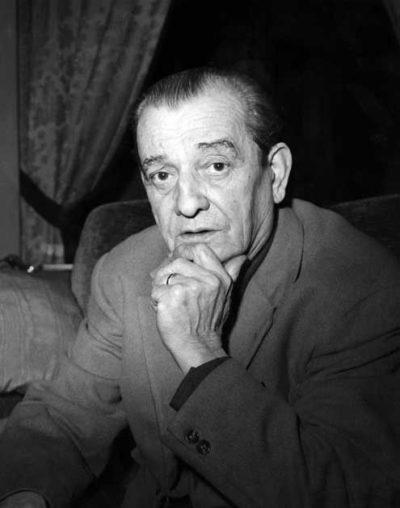Marcel Pagnol (Marcel Pagnol)

In 1926, on a visit to London, Marcel Pagnol attended a screening of one of the first talking films and he was so impressed that he decided to devote his efforts to cinema. He contacted Paramount Picture studios and suggested adapting his play Marius for cinema. This was directed by Alexander Korda and released on 10 October 1931. It became one of the first successful French-language talking films. In 1932 Marcel Pagnol founded his own film production studios in the countryside near Marseille. Over the next decade Pagnol produced his own films, taking many different roles in the production – financier, director, script writer, studio head, and foreign-language script translator – and employing the greatest French actors of the period. On 4 April 1946, Pagnol was elected to the Académie française, taking his seat in March 1947, the first filmmaker to receive this honour. In his films, Marcel Pagnol transfers his playwriting talents onto the big screen. His editing style is somberly reserved, placing emphasis on the content of an image. As a pictorial naturalist, Pagnol relies on film as art to convey a deeper meaning rather than solely as a tool to tell a story. Pagnol also took great care in the type of actors he employed, hiring local actors to appear in his films to highlight their unique accents and culture. Like his plays, Pagnol’s films emphasize dialogue and musicality. The themes of many of Pagnol’s films revolve around the acute observation of social rituals. Using interchangeable symbols and recurring character roles, such as proud fathers and rebellious children, Pagnol illuminates the provincial life of the lower class. Notably, Pagnol also frequently compares women and land, showing both can be barren or fertile. Above all, Pagnol uses all this to illustrate the importance of human bonds and their renewal.
In 1945, Marcel Pagnol remarried, to actress Jacqueline Pagnol. They had two children together, Frédéric (born 1946) and Estelle (born 1949). Estelle died at the age of two. Pagnol was so devastated that he fled the south and returned to live in Paris. He went back to writing plays, but after his next piece was badly received he decided to change his job once more and began writing a series of autobiographical novels – Souvenirs d’enfance – based on his childhood experiences. In 1957, the first two novels in the series, La Gloire de mon père and Le château de ma mère were published to instant acclaim. The third Le Temps des secrets was published in 1959, though the fourth Le Temps des Amours was to remain unfinished and was not published until 1977, after his death. In the meantime, Pagnol turned to a second series, L’Eau des Collines – Jean de Florette and Manon des Sources – which focused on the machinations of Provençal peasant life at the beginning of the twentieth century and were published in 1962. Pagnol adapted his own film Manon des Sources, with his wife, Jacqueline, in the title role, into two novels, Jean de Florette and Manon des Sources, collectively titled L’Eau des Collines. Marcel Pagnol died in Paris on 18 April 1974. He is buried in Marseille at the cemetery La Treille, along with his mother, father, brothers, and wife. His boyhood friend, David Magnan (Lili des Bellons in the autographies), died at the Second Battle of the Marne in July 1918, and is buried nearby.
Born
- February, 28, 1895
- Aubagne, France
Died
- April, 18, 1974
- Paris, France
Cemetery
- Marseille ( cimetiere de la Treille)
- Marseille, France

